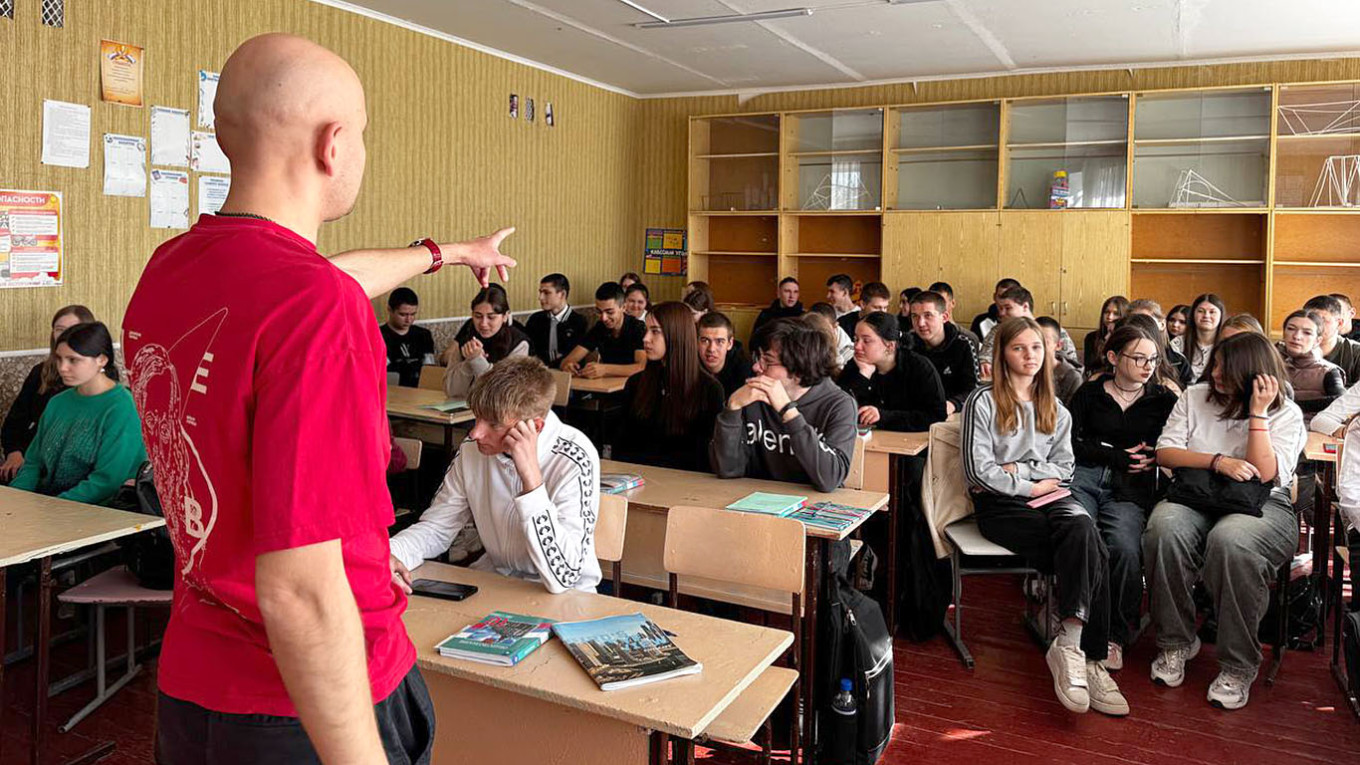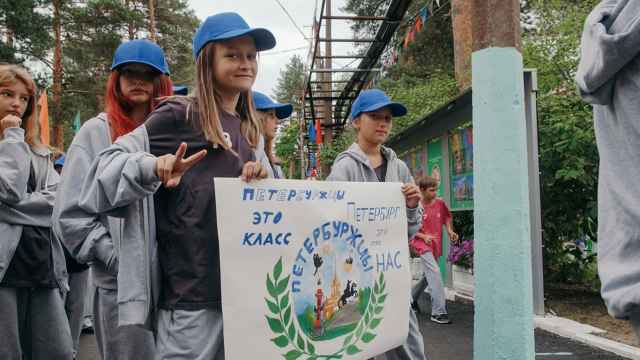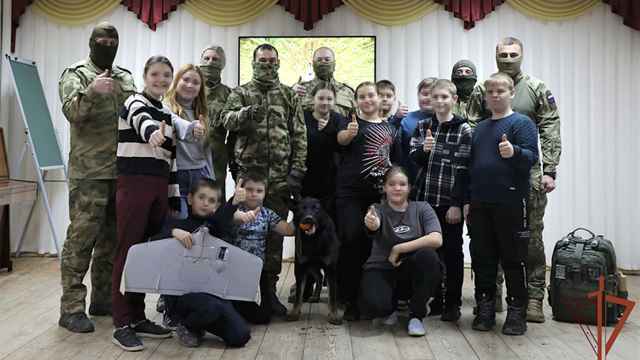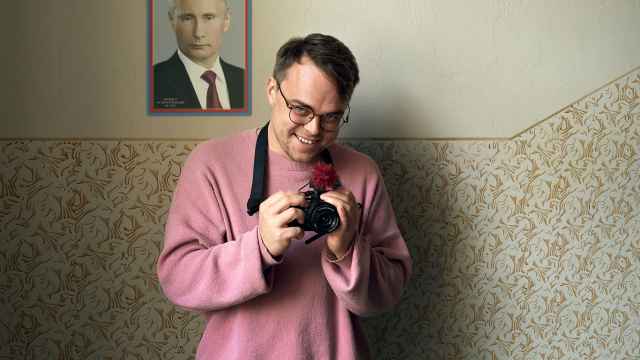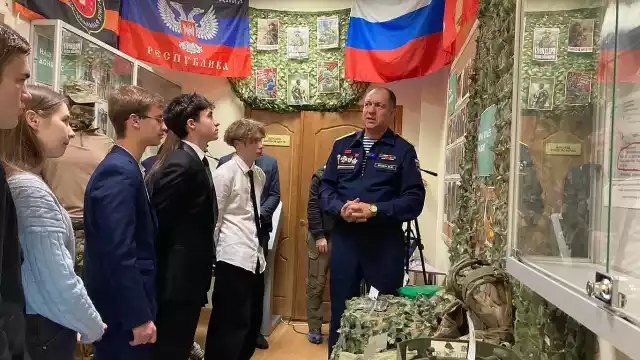“We live in an amazing time when everyone can become part of a major media movement,” says pro-war pop singer Nikolai Baskov.
He is inviting children and teenagers in occupied Ukraine to join MediaAttraction, a media school organized by the pro-Kremlin youth group Movement of the First.
Days after launching the full-scale war in Ukraine in 2022 Russian authorities began setting up media schools for teenagers in the occupied territories, teaching them how to use a camera and become “real journalists.”
MediaAttraction schools have since opened in Mariupol, Henichesk, Donetsk, Luhansk and other occupied cities, in what experts say is a state initiative to mint Kremlin-loyal bloggers and correspondents in the occupied regions.
The project is currently holding a journalism competition in which schoolchildren are asked to write about their “new homeland.” The top five submissions will be published in the movement’s Magazine of the First. Other prizes include a copy of “History of the Russian State” by Nikolai Karamzin, a foundational text in imperial Russian historiography.
Magazine of the First debuted in February. Its inaugural issue featured a poem by Denis Dymchenko, a Russian soldier killed in Ukraine. Another article commemorated Dmitry Savluchenko, a Russian-installed official who oversaw youth policy in the Kherson region and was killed by a car bomb in 2022.
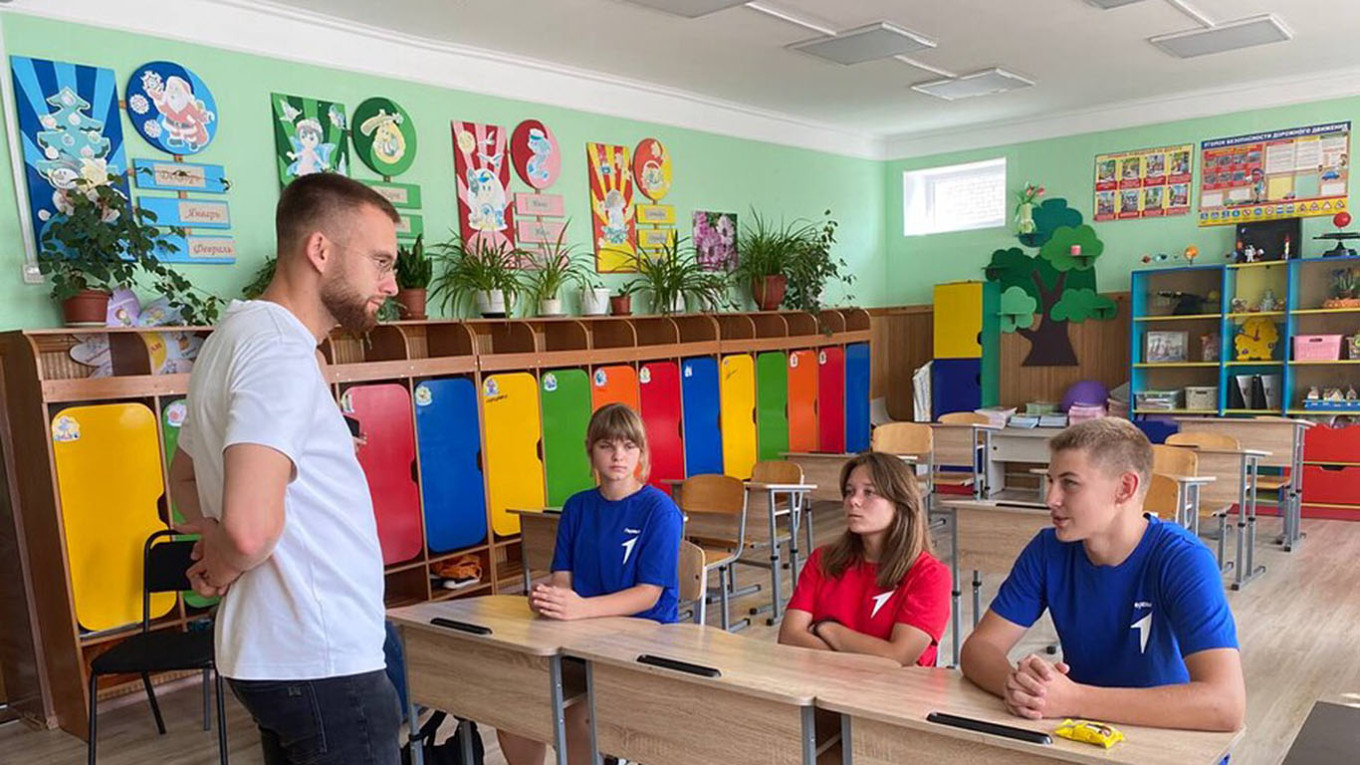
Savluchenko “never made political statements,” writes eighth-grade student Karolina Norchenko, a member of the Movement of the First’s Kherson branch. “He worked only with children, families and youth.”
Her tribute appeared in a section titled “Heroes of the Liberated Kherson Region.”
Other sections in the magazine include “Russia Is My Home,” “Volunteering,” “Education” and “History.” In the latter, children are invited to write about World War II veterans and Russian soldiers born in the Kherson region who fought in the war in Ukraine.
“With our return to the Russian Federation, our lives have changed significantly,” said Sofiya Poleshchuk, another member of the youth movement, at the magazine’s launch event. “The state pays special attention to us, creating vast opportunities for learning, creativity and self-fulfillment. It wasn’t like this before — under Ukraine, we didn’t feel such support or see so many prospects.”
Beyond MediaAttraction, the Movement of the First is actively promoting the neo-imperial state-backed ideology of the “Russian World” across occupied Ukraine.
In April, a lecture series on the “Russian World” was held in 16 schools across occupied Kherson. According to the Russian-installed local administration, more than 290 students from grades 5 through 11 attended the talks.
The lectures are part of an initiative spearheaded by Alexei Lavrentyev, the movement’s regional head, and funded by Rosmolodezh, Russia’s federal youth agency.
“Thanks to such educational projects, children and teenagers gain not only knowledge, but also an understanding of their historical and cultural identity,” Lavrentyev said.
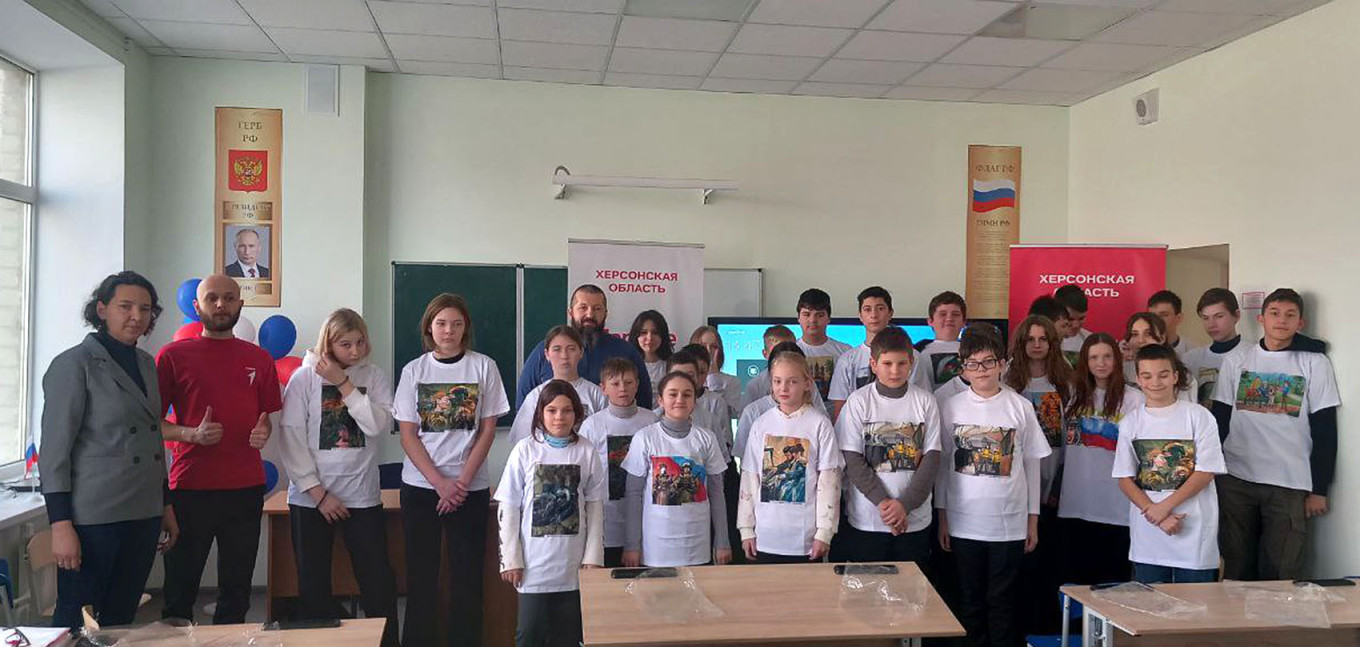
Among the projects is a video series titled “Significant Adult,” filmed by 15-year-old Lenya, a student in Kherson who dreams of becoming a journalist. In the show, she interviews officials from the Russian occupation administration including Vladimir Saldo, the Moscow-appointed head of Kherson.
Despite praise from propagandist Alexander Malkevich, “Significant Adult” has failed to gain traction online, with under 10 followers on VK and only 28 subscribers on RuTube, Russia’s domestic knockoff of YouTube.
‘If someone is ready to learn, the doors to public service are open’
Malkevich, a propagandist with ties to the late Wagner Group leader Yevgeny Prigozhin, started expanding his media empire in occupied Ukraine in the summer of 2022.
In addition to launching the Tavria TV and Mariupol 24 channels, he launched the First Media School of the New Regions, promising jobs at his outlets for every young person who graduates.
“In short, nothing like this has ever existed here before!” he wrote in August 2022.
“If someone is ready to learn, the doors to public service are open,” occupying official Yevgeny Brykov added.
One graduate of Malkevich’s school appeared in a video burying her Ukrainian passport with several other teenagers. In the clip, the group expresses disillusionment with the Ukrainian government.
“We’ve had enough. We don’t want anything to do with Ukraine anymore. We’re not even sure it will exist in the future,” one of the girls says. The clip ends with the words “Now we are with Russia,” set to “Call Me With You” by Alla Pugacheva — a beloved Russian singer who has publicly condemned the war.
Malkevich reposted the video, adding approvingly: “I’ve already gotten in touch with her.”
In 2023, Malkevich published a textbook titled “Real Russian Journalism for the New Regions,” which he billed as an antidote to what he called “insane Ukrainian propaganda.”
“Listen to the opinion of the majority, and no one will deceive you,” reads a piece of advice from Malkevich’s textbook quoted by the pro-Russian Kherson News Agency.
‘That was the case until signs of misanthropy began to emerge in Kyiv’
Russia’s efforts to cultivate loyal young journalists extend to competitions such as YUNKOR-2025, which concluded this spring with five teams of teenagers from Mariupol.
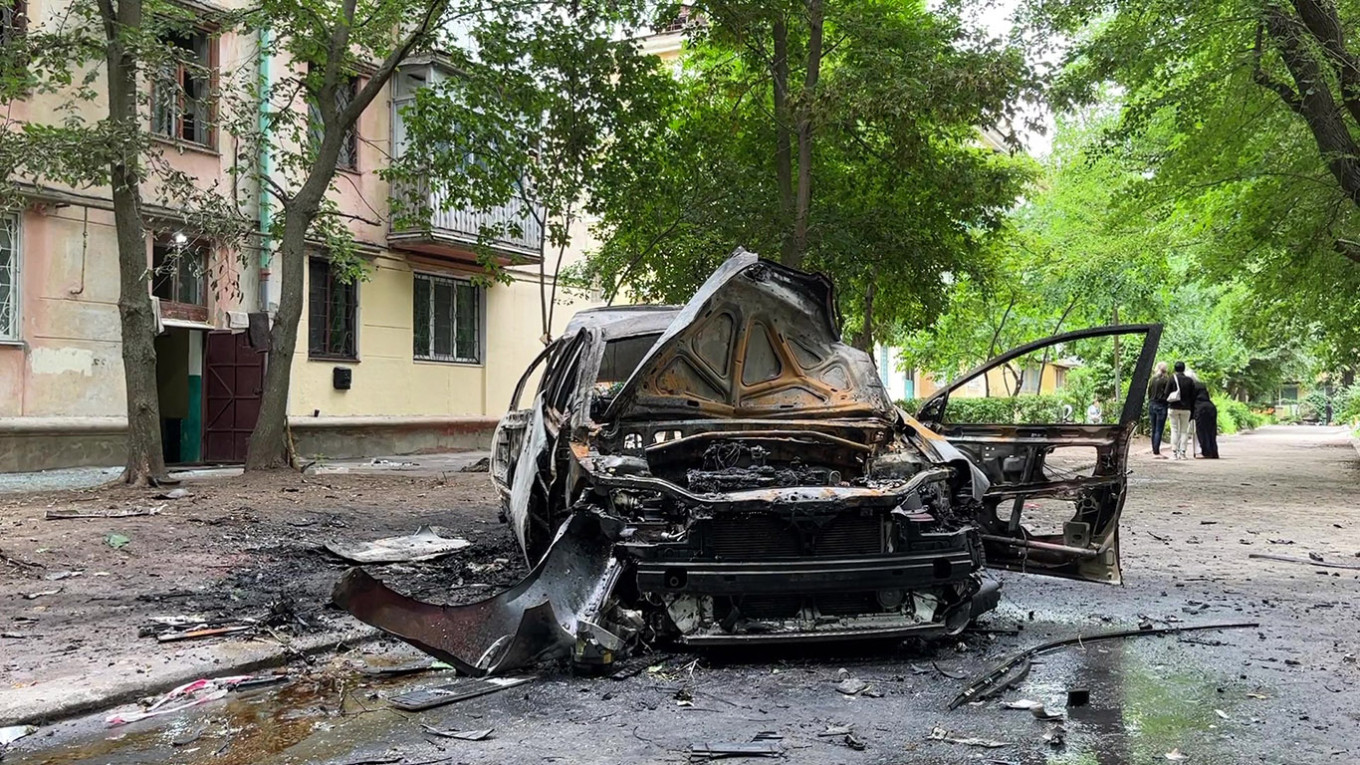
One group of high school girls filmed a state television-style video about life in Mariupol under Russian control. It opens with sweeping shots of Lenin Square (renamed from Freedom Square by Russian authorities), the Azov Sea pier, chestnut trees and the neo-Gothic mansion of famed Mariupol doctor Sergei Gamper.
“Blooming chestnut trees, seagulls crying, smoking factories and the quiet sparkle of the sea all spoke of a peaceful and prosperous life [in Mariupol]. That was the case until signs of misanthropy began to emerge in Kyiv,” the video’s narrator says.
The report ends with the words: “Mariupol is part of our shared history.”
In Mariupol, the Movement of the First operates youth media centers with support from the Donbass Media Center (DMC), a pro-Russian initiative aimed at encouraging engagement with new media platforms, CNN reported this month.
Teenagers who complete their training often post videos highlighting how Russia is “rebuilding” the city. One young blogger told CNN that these videos are becoming a new trend.
But the DMC is not the only pro-Russian media initiative active in the city. This spring, the Donetsk chapter of Russian youth movement Yunarmiya (“Youth Army”) applied for a presidential grant to build four media studios in Donetsk, Mariupol, Shakhtarsk and Kirovsk. The application requested 997,000 rubles (roughly $12,000), about the same amount the Kremlin spent launching the Mariupol media school.
According to the grant proposal, children and teens attending these studios will also produce a film about Yunarmiya in their region. The premiere is slated for the fall, to coincide with the anniversary of Russia’s September 2022 annexation of the Luhansk, Donetsk, Kherson and Zaporizhzhia regions.
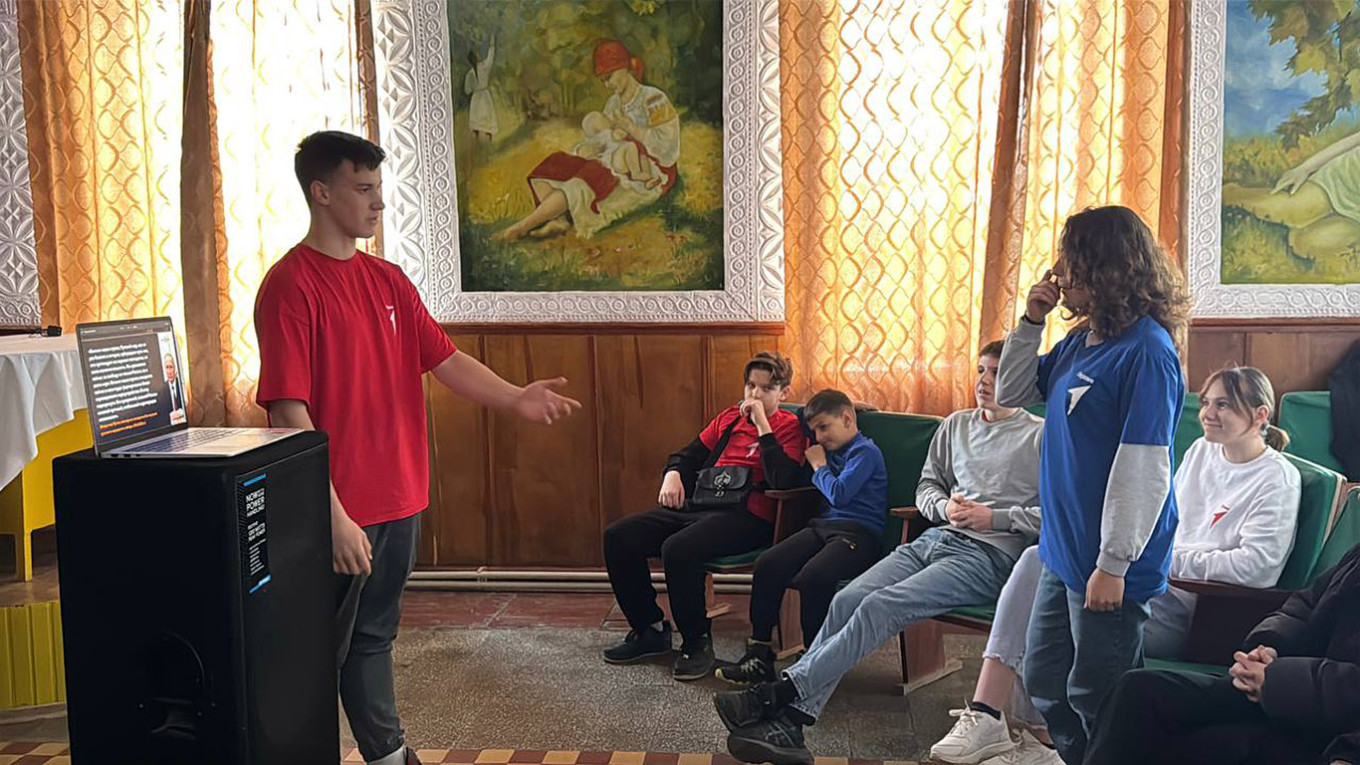
Analysts say these initiatives aim to build a new generation of Kremlin-aligned war correspondents in contrast to the current class of military bloggers, who often criticize Russia’s handling of the war.
“Today’s war correspondents are not particularly loyal to the Russian authorities. They irritate the Kremlin,” Ivan Stupak, an adviser to the Ukrainian parliament’s national security committee, told The Moscow Times. “By creating these media schools, the government is cultivating a new generation of war correspondents from scratch. Over time, these teenagers will become young war reporters who will run Telegram channels and TikTok in a way that aligns with the Kremlin’s agenda.”
“The main weapon of these future war correspondents is their audience. They won’t even have the chance to criticize the authorities, because these bloggers are being nurtured from the ground up by the Russian state,” Stupak said.
A Message from The Moscow Times:
Dear readers,
We are facing unprecedented challenges. Russia's Prosecutor General's Office has designated The Moscow Times as an "undesirable" organization, criminalizing our work and putting our staff at risk of prosecution. This follows our earlier unjust labeling as a "foreign agent."
These actions are direct attempts to silence independent journalism in Russia. The authorities claim our work "discredits the decisions of the Russian leadership." We see things differently: we strive to provide accurate, unbiased reporting on Russia.
We, the journalists of The Moscow Times, refuse to be silenced. But to continue our work, we need your help.
Your support, no matter how small, makes a world of difference. If you can, please support us monthly starting from just $2. It's quick to set up, and every contribution makes a significant impact.
By supporting The Moscow Times, you're defending open, independent journalism in the face of repression. Thank you for standing with us.
Remind me later.


